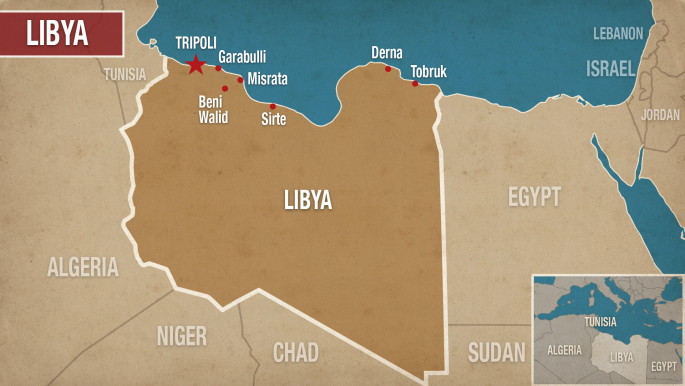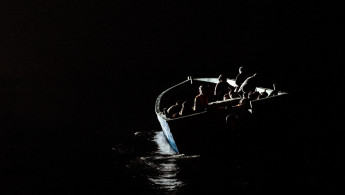Tortured, disappeared, displaced: Libyans in the hands of smugglers
Khaled is from Surman in western Libya, the area that for years has been the crucial centre of human trafficking under the control of local mafias. As soon as he finished his studies, he began working with victims, helping to recover migrants after shipwrecks or collecting corpses on beaches and filling dozens of unidentified body bags.
"In the last four years the government has paid me 5,000 dinars – at the official exchange rate this is more or less 4,000 euros, but at the exchange rate on the black market, this just about fetches around 800 euros," the 28-year-old explains.
"Public employees should be protected by the government, instead we are waiting for months on end for our salaries to be paid, but the money never comes."
Khaled has a tablet with pictures from his years of work with the Libyan Red Crescent. His photos tell the story of what Libya has become in recent years.
 |
Women alone pay the highest price here, they are subjected to all kinds of abuse |  |
"I have seen bodies of drowned children for years, whole families brought back from the waves after the rubber boats on which they tried to cross the Mediterranean were sunk. The government does not have money for people like me, but provides bags for the corpses," he says.
He shows a picture of a child's body on his tablet, he was seven or eight-years-old, Khaled says. He then shows a picture of a woman under a tree, her body half buried.
"Someone certainly left her there to die alone," Khaled says. "Maybe she felt sick, maybe someone had beaten her up or raped her. I have found bodies of abandoned women under trees or near beaches on several occasions. Women alone pay the highest price here, they are subjected to all kinds of abuse."
He stops on an image from June 2016. It was taken in Zuwara, about 50 kilometres from the Tunisian border and shows over a hundred bodies on the beach, some in an advanced state of decomposition.
"It was one of the saddest days of my life," he says.
Khaled stops on another picture, sighing. It shows two guys sitting inside a car, hugging and smiling. They look happy.
"That's me and my friend Husen," Khaled says. "He's also 28-years-old, a few months ago he found out he had cancer. He couldn't be treated here in Libya, so he applied for a visa to get to Europe, but it was rejected," adding that he wasn't given the reasons as to why.
 |
Seven years after the revolution, this is the only prospect for a young Libyan who wants to leave the country: risk dying and drowning in the Mediterranean by putting himself in the hands of traffickers |  |
After hesitation, Khaled continues, "Without a valid visa, and without a legal way to get to Europe, he had to contact smugglers.
"I know it seems a paradox, because this is something I fight against every day: this kind of criminality, corruption and control of mafias and smugglers on the lives of citizens, especially after all the trauma I have witnessed on Libyan shores for years. But today I feel cornered, I have no choice. Seven years after the revolution, this is the only prospect for a young Libyan who wants to leave the country: risk dying and drowning in the Mediterranean by putting himself in the hands of traffickers," Khaled says.
Since the start of 2018, Libyans have been arriving in Europe by sea, many are families with young children.
On March 10, the Spanish NGO, Proactiva Open Arms, rescued three brothers travelling on a rubber boat in a desperate attempt to get to Europe. The youngest, a 14-year-old, was suffering from leukaemia and the brothers were hoping to get to Europe for treatment.
'Migrants in our own country'
Men, women and children across Libya are arbitrarily detained or unlawfully deprived of their liberty based on their tribal or family links and perceived political affiliations, a United Nations Human Rights Office report said this month.
The report found that armed groups, including those affiliated with the state, are holding thousands of people in prolonged arbitrary and unlawful detention, submitting them to torture and other human rights violations and abuses.
"This report lays bare not only the appalling abuses and violations experienced by Libyans deprived of their liberty, but the sheer horror and arbitrariness of such detentions, both for the victims and their families," said UN High Commissioner for Human Rights Zeid Ra'ad Al Hussein. "These violations and abuses need to stop – and those responsible for such crimes should be held fully to account."
Rather than reining in armed groups and integrating their members under state command and control structures, successive Libyan governments have increasingly relied on them for law enforcement, including arrests and detention; paid them salaries; and provided them with equipment and uniforms," the report says. As a result, their power has grown unchecked and they have remained free of effective government oversight.
 |
We are stuck here, migrants in our own country. I live in a Libya that I no longer recognise, this is no longer my country... We are denied visas, we cannot move from here: the only solution seems to be getting on a rubber boat to Europe |  |
 |
|
| Migrants from sub-Saharan Africa rest inside a detention centre in the Libyan capital Tripoli [Getty] |
"Migrants are tortured and Libyans simply disappear," says 50-year-old Massoud Ali, as he looks out at the sea in Misrata, a once tourist hotspot and home to wealthy holidaymakers, but now a refuge for escaping families.
Massoud was a university teacher in Benghazi, but his family were forced to flee from the city and are now one of the thousands internally displaced and living in a country in chaos.
"In Benghazi, you can leave your house in the morning to go out to buy some bread and suddenly disappear. Nobody knows anything. Then a week or month later, someone finds your body hidden behind a dumpster, while your family sells all their possessions to pay a useless ransom," he adds.
Massoud's brother was kidnapped and killed by a criminal gang in the city.
"In Benghazi we were the men of the revolution, today the city is in the hands of the bandits and we have nothing left."
Massoud's family have lived between Tripoli, Zliten, Zuwara and Misrata, where they are now currently staying.
"We are stuck here, migrants in our own country. I live in a Libya that I no longer recognise, this is no longer my country. I wake up and I look out to the sea wondering what will happen to my life and that of my children. I feel like an illegal citizen in my country. We are denied visas, we cannot move from here: the only solution seems to be getting on a rubber boat to Europe."
Others feel Massoud's anger and pain. Ali Haadani had a farm in Benghazi, while Mohammed Ennace had a construction company and ten employees.
"We were the middle class of the country, workers who were ready to give their resources and skills to develop a new society," says electronic engineer, Omar Ali.
"Today we only have a plastic bag with a pile of clothes, this is what remains of our past," he adds. "We cannot go back to Benghazi because the criminal gangs will make our lives miserable, the only chance we have are to escape through the smugglers."
 |
|
| Misrata once used to be a popular tourist destination [The New Arab] |
On February 2 this year, 10 bodies washed up on shore on a beach in Zuwara, a port city in north western Libya. The tragedy came after an estimated 90 migrants were feared to have drowned off the coast of Libya when a smuggler's boat capsized early on a Friday morning. Survivors told aid workers that most of the migrants on board were Pakistanis, but there were also Libyans on board.
One of the victims was allegedly Abdul Bari, a young man from Tripoli. He wanted to get to Europe for a better life. Abdul Bari wanted to escape from the power of the militias, from the fear of kidnapping and torture. All he wanted was a visa, but he was denied one, so instead he contacted a trafficker and instead tried to escape by sea.
"I have only one life and I want to live it somewhere else" were the last words he wrote on his social media before he was feared to have drowned.
Francesca Mannocchi is a journalist who previously reported from the front lines of the battle for Mosul and on the refugee crisis in Libya.
Follow her on Twitter: @mannocchia







 Follow the Middle East's top stories in English at The New Arab on Google News
Follow the Middle East's top stories in English at The New Arab on Google News


